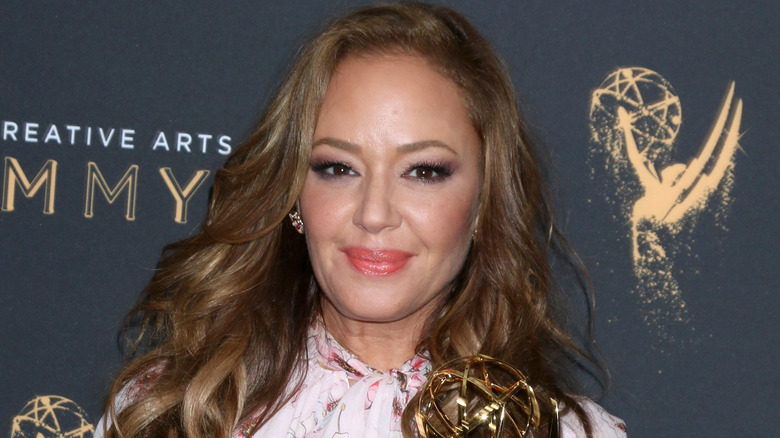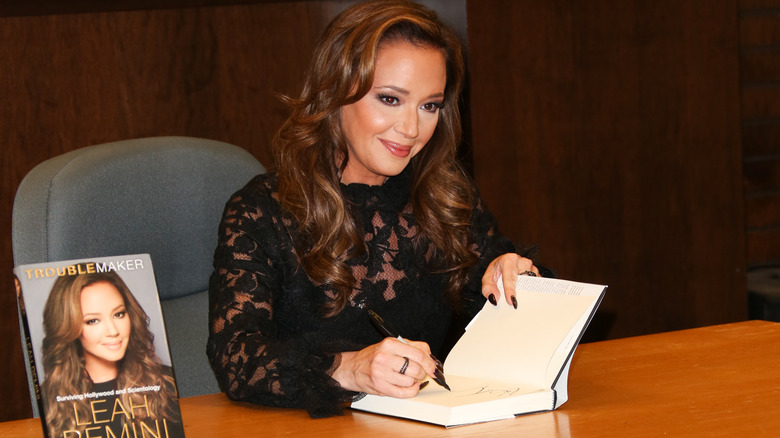How Leah Remini Really Feels About Elisabeth Moss
Elisabeth Moss has skyrocketed to fame by playing strong-willed, complex women in almost everything she's done. From bringing to life the ambitious secretary-turned-copy-chief Peggy Olson in "Mad Men," to the fearless detective Robin Griffin in "Top of the Lake," and the ruthless June Osborne in "The Handmaid's Tale," Moss has injected a deep sense of empowerment to her characters. Given her résumé, Moss has earned a reputation for playing feminist characters, though Moss asserts that's not why she wanted to play them.
From the get-go, she was just after well-written characters, she told Time. "A question I get asked a lot in interviews: Do you gravitate toward feminist roles? This is a question I struggle to answer because I don't necessarily feel like they are feminist roles. I feel like they're interesting women. 'The Handmaid's Tale' is considered one of the great feminist novels. I actually consider it a human novel about human rights, not just women's rights," Moss said.
In spite of how she approaches her work and her characters, Moss is a self-identified feminist, even if she didn't always know the name for it, as she detailed in an interview with Vulture. "I was born. I was born, and then I was a feminist," she said. But Leah Remini doesn't buy into Moss' rhetoric. In fact, Remini believes Moss is a hypocrite for publicly promoting feminism and reproductive rights, while also defending a "corrupt" religious organization. Keep reading to learn why Remini feels that way about Moss.
Leah Remini thinks Elisabeth Moss is 'getting away with' being both a feminist and a Scientologist
For Leah Remini, the press is allowing Elisabeth Moss to promote feminism and defend the Church of Scientology concomitantly out of convenience. "The hypocrisy is asinine. [Moss] is getting away with it because with most press, people are p**sies. They want the celebrity to get to talk with them, and like them. You know, I don't respect it, I don't admire it, and I don't think there's anything remotely cute about it," Remini, who left the church in 2013, told the Daily Beast.
While she usually avoids the subject, Moss has publicly defended Scientology. In 2017, a user asked in the now-disabled comments section of an Instagram photo whether "The Handmaid's Tale" had made her change her views, considering "Gilead and Scientology both believe that all outside sources (aka news) are wrong or evil," as People reported. Moss came out in defense of her faith. "That's actually not true at all about Scientology. Religious freedom and tolerance and understanding the truth and equal rights for every race, religion and creed are extremely important to me," Moss responded.
Remini believes that Moss, much like herself in the past, has been brainwashed by the church. "I was indoctrinated, just as Elisabeth [Moss], to not read what's on the internet, to not read anything ... So, she knows nothing about what she's talking about, she just needs to respond the way Scientology wants her to respond," Remini told the Daily Beast.
Leah Remini has become one of the fiercest critics of Scientology
In 2013, Leah Remini sent shockwaves across Hollywood and the country when she announced she was leaving the Church of Scientology, becoming one of the organization's most famous defectors, USA Today noted. The "King of Queens" star began to change her views regarding the church around 2006, when star Tom Cruise married Katie Holmes, Page Six reported. At the time, Remini wondered why Shelly Miscavige, the wife of Scientology leader David Miscavige, wasn't at the wedding, but was told off, per the report. "You don't have the [bleeping] rank to ask about Shelly," former Scientology Celebrity Centre head Tommy Davis reportedly told her.
Shelly has allegedly not been publicly seen since 2007, according to Radar Online. Because of Remini's inquiries regarding her friend's disappearance, she and her family were blacklisted and investigated, per Page Six. Since defecting, Remini has released the 2015 book titled "Troublemaker: Surviving Hollywood and Scientology" and produced the A&E series "Leah Remini: Scientology and the Aftermath," which ran for three seasons between 2016 and 2019. The series won several accolades, including two Emmy awards of a total of five nominations.
The Church of Scientology has long argued that Remini's views are attempts to remain on the news. "She needs to move on with her life instead of pathetically exploiting her former religion, her former friends and other celebrities for money and attention to appear relevant again," the organization wrote on its website.



